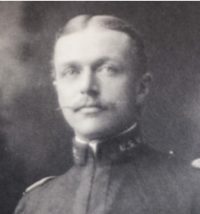Left Malate at about 7 A.M. for the station, three miles’ distance. Went in heavy marching order and was wet through with perspiration when we reached it, we having made no stops. Took train for San Fernando. Outside of Manila the rice swamps extend for many kilometers. Most of them were under cultivation, but a fair proportion were not. Soon began to cross the niggers’ (as the troops call them) rifle pits. Were very well made and were roofed in part with bamboo. At Malolus [Malolos], where the fight at the church took place, the pits were very numerous. Also at Calumpit, the scene of Funston’s exploit. Were in what were apparently third-class coaches of the European model except that the division line of the compartments was only about breast high. In the rice fields the natives were planting the young rice plants. Reached San Fernando at about 1 P.M. sixty-six kilometers front Manila. Track guarded by detachments at important places. Marched to barrack, about five minutes’ walk from station. Apparently the home of a planter, as outhouses and sheds were filled with sugar draining off. Had scarcely time to look around when Sert. Casey said to me, “Get fifty additional rounds of ammunition and blanket roll and be ready to start in half an hour.” Was ready and found a detail of twenty-five men and Lieut. Oakes. Captain was looking over the detail and threw some out. Was proud to be put in the first detail made from the company. Marched to the commissary and found we were going as guard to a bull train, 40,000 rations and ammunition which was going to the firing line, only six miles distant. “Load chamber and magazine.” It gave me a little thrill to hear the order, the first time I had ever heard it save at drill. The train moved out, thirty-nine native carts and two mule teams. Was put into the advance guard, blanket roll on one of the buffalo carts. Typical village. All houses raised off the ground and built of bamboo. “Aggie” himself tried to take this town on 4th of July last, having previously sent word to the American commander that he intended dining here on that day. He didn’t, nor on August 4th either, and the chances are against his dining here for some time. So we soon came to rifle pits, very substantial they looked too. Here came our first taste of what was coming, for the pits were full of water which we had to wade. Here came our first breakdown and a delay of fifteen minutes, breakdowns and delays were so frequent after that that I shan’t mention. All houses deserted. Rice fields not cultivated but fall of water, as we found to our cost, the road being straight across them. About 5 P.M. (we had nothing to eat since breakfast) we came in sound of the distant battle. (It was the 12th Infantry taking the town of Angeles.) You could hear the crashes of the volleys and the occasional boom of a field-piece. Every one I think would have been glad if the train, which stretched out over a quarter of a mile, had been attacked. Our danger of course was from raiders and marauding parties. It commenced to rain now and we came to a stream breast deep and very swift through which we plunged and halted, waiting for the train to close up. I thought they never would get the caribous [carabaos] through that stream. Every one of the beasts laid down in the water, and beatings nor bayonets could move him till he was ready. Such language! Frantic officers, stolid Chinos (as they call the Chinese), the natives solicitous lest their precious beasts be abused and twenty-five wet, tired, hungry and thoroughly exasperated soldiers. We crossed three such rivers and the same thing was repeated at each one. At one we had a new experience. It was very dark now. The “point” suddenly challenged. Natives of course, two of them, loudly professing friendship. Spies I dare say, but orders are strict to treat all natives as friendly unless they are in uniform or have a rifle, so we let them go. We were not in a good place to be attacked, half the train on one side of the river, half on the other. We thought it had been raining before. It commenced now in earnest. I never saw such a rain. I was the point then, the most advanced point, the head of the train about three hundred yards in rear. I could feel the water running down my back inside my clothes, was cold and could not see ten feet in any direction. You may be surprised, but I was not at all anxious for the train to be attacked. We finally moved off and finally the moon came out and then fireflies by hundreds. Soon we came to the railroad. The insurgents had torn up about five miles of it, so we marched down the road-bed. Then we came to a cane brake and the damned buffaloes would not go on unless they had sugar cane. We called them sensible animals then, for we had been going since 5 A.M. without food and it was 1 P.M. then. Well, we finally got to San Angeles about 12 P.M., found our blanket rolls with difficulty, ate some hard tack and looked for a dry place to sleep. I found one under a table where the Signal Corps was taking telegraph messages from the firing line about a mile ahead of us. By great good luck I had a clean suit of underclothes in my blanket and so slept warm and dry.
